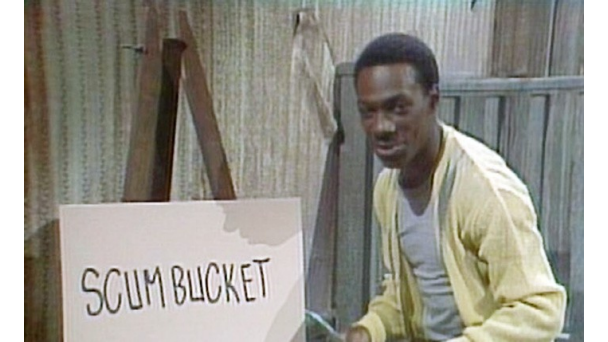Saturday Night Live’s 40th anniversary celebration turned out to be quite a show, especially with the appearance of Eddie Murphy, who skipped the 25th anniversary. This gives me an excuse to share a Lucille Clifton’s poem about Murphy, “from the wisdom of sister brown.”
By all accounts, Murphy saved SNL in the early 1980s when it was on the verge of collapse. According to actor Ed Norton, Murray represented a “seismic shift and a reinjection of excitement” into the show. Monologues like “Mr. Robinson’s Neighborhood” and “Lincoln’s Birthday” are still striking for their handling of racial stereotypes.
In her poem Clifton also mentions Murphy’s comic predecessor, Richard Pryor. Pryor also made fun of stereotypes of race, most famously in his word association interchange with Chevy Chase where racial epithets, including the n-word, fly wild and free. Clifton picks up a key difference, however.
I don’t know if Sister Brown is an actual person or if Clifton is simply taking on the persona of a wise old woman who looks at the world and sees things that the younger generation misses. For instance, whereas many are dazzled by Elizabeth Taylor, “Sister Brown” is drawn to the tricky smile of singer Lena Horne. Brown sees world weariness where others, especially white audiences, might see only fun. It’s a carefully masked weariness, however. Here’s the poem in its entirety:
from the wisdom of sister brown
By Lucille Clifton
1.
on sisterhood
some of our sisters
who put down the bucket
lookin for us
to pick it up
2.
on lena (born 6/30/17)
people talk about beautiful
and look at lizabeth taylor
lena just stand there smilin
a tricky smile
3.
on the difference between
eddie murphy and richard pryor
eddie, he a young blood
he see somethin funny
in everythin ol rich
been around a long time
he know aint nothin
really funny
If Murphy became a bigger star than Pryor, it may be in part because he was less threatening to white audiences. A refusal to avoid certain topics helps explain why Pryor’s s television show didn’t succeed. I’m not certain that Clifton is accusing Murphy of failing to pick up the bucket put down by Pryor, however. Perhaps she is just shaking her head at a generational shift.


